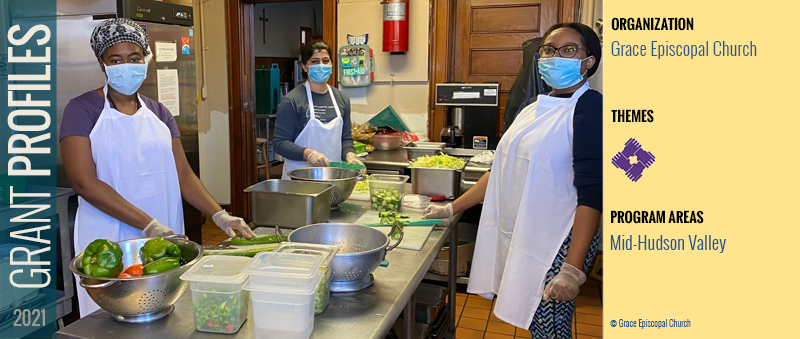Grace Episcopal Church is one of the oldest congregations in Middletown, founded in 1845. From its location in the center of the city, the church’s large parish hall has served as a community center for over a hundred years. In 1980, in response to growing poverty and need in the neighborhood, the church opened the Guild of St. Margaret Soup Kitchen in the parish hall. Serving hot meals every day of the year, typically totaling over 33,000 meals annually, the Guild of St. Margaret Soup Kitchen is a key part of Middletown’s social safety net for people in need. Its Food Service Coordinator creates menus that meet or exceed nutrition standards and are made using nutritionally dense whole foods, including produce, vegetables, meats, fruits, and milk with as little reliance on processed foods as possible. The paid staff supervise over 300 registered and trained volunteers who work a combined total of 258 volunteer hours per week. The staff and volunteers provide meals, hospitality, assistance with food stamp applications, and referrals to additional services including housing, medical issues, veterans’ benefits, and many others.
The COVID-19 pandemic exacerbated food insecurity in Middletown while making the Soup Kitchen’s operating model of serving large groups of people together impossible to continue. With just a few paid staff and many dedicated volunteers, the Soup Kitchen quickly shifted to a take-out model to ensure the safety of both staff and clients. Beginning in March of 2020, every person in need began to receive a “grab and go” bag containing a hot meal and a cold supper for later. In April of 2020, a food pantry was added to meet the growing food insecurity crisis in Middletown. By the end of 2020, the Guild of St. Margaret Soup Kitchen had served a record 90,741 meals: 48,573 through the Soup Kitchen itself and 42,168 through the food pantry.
In 2021, Grace Church received renewed program support from the Dyson Foundation for the Guild of St. Margaret Soup Kitchen, as well as a grant towards the additional costs associated with pandemic-related service delivery.

